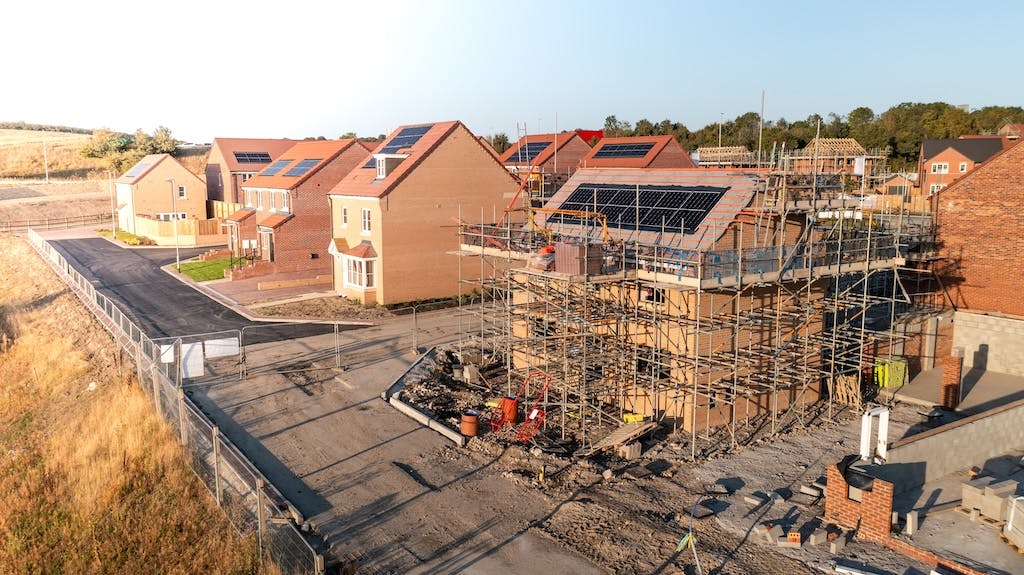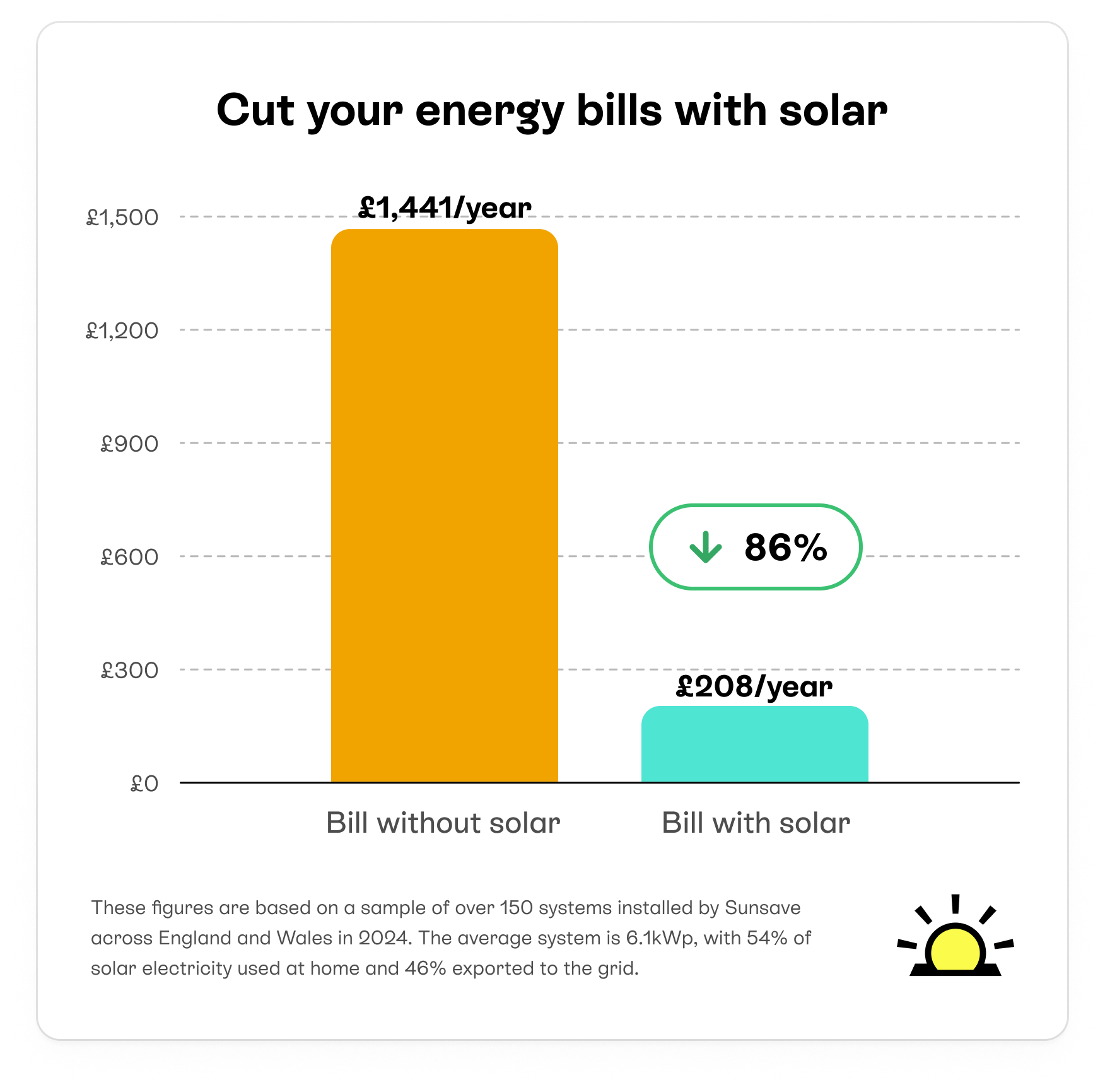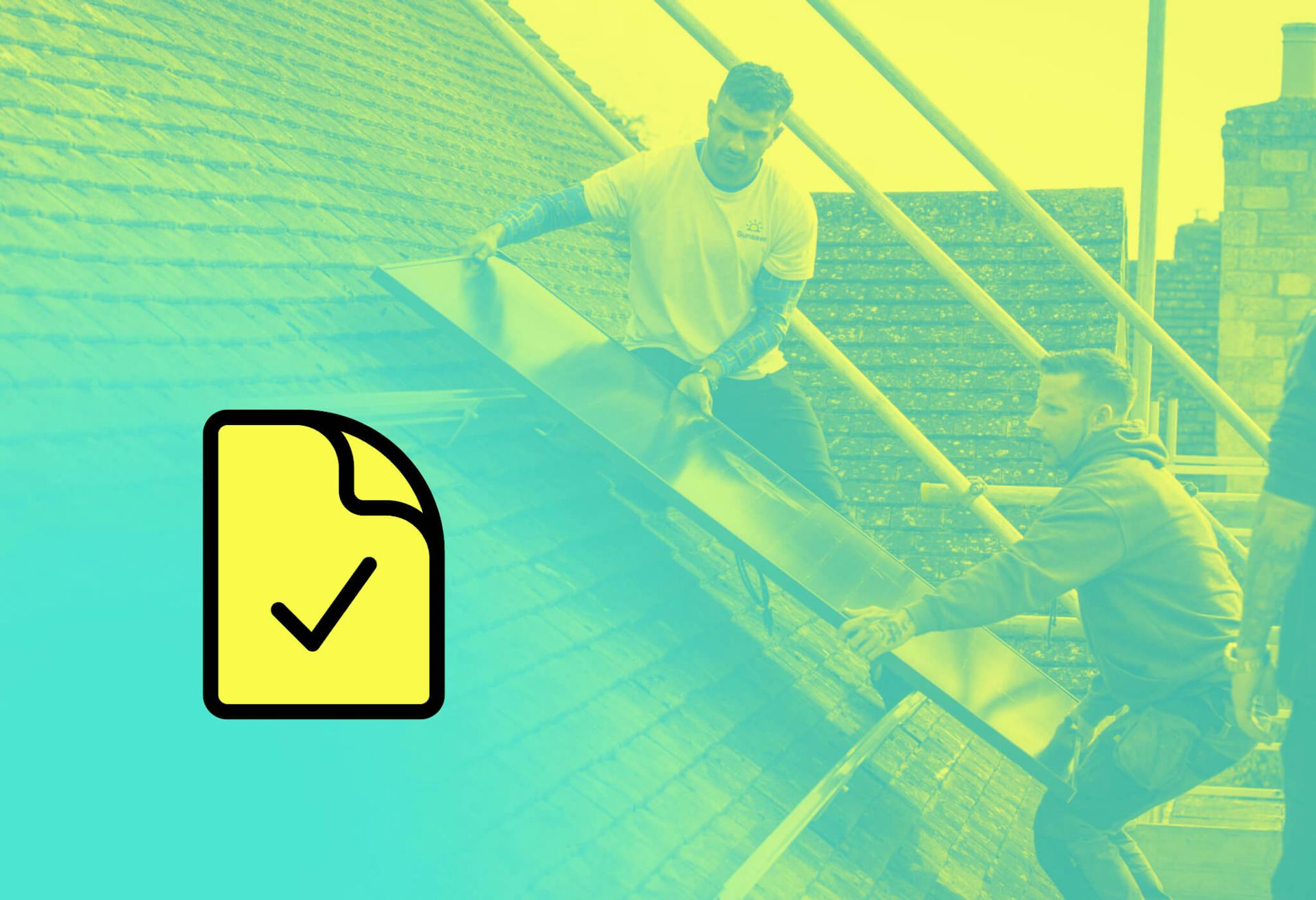- Solar advice hub
- Installation
- Solar panels on new builds: what are the rules?
Solar panels on new builds: what are the rules?
Here are the current regulations surrounding solar panels on new builds, and whether we expect them to change any time soon.


Why you can trust our content
We know that the solar industry is full of misinformation, but we only use reliable sources, including:
- Our experienced solar experts, installers and system designers
- Our own database of solar & battery system designs
- Authoritative bodies like MCS and the UK government




At a glance
There is a desperate need for more housing in the UK right now, and – in the face of high energy bills – a similarly desperate need for green energy.
It would make sense to kill two birds with one stone and ensure that all newly built homes in the UK have solar panel systems, but is this actually what’s happening right now?
In this article, we’ll explore the UK’s current approach to solar panels on new builds, consider what needs to change, and see how countries are tackling the issue in the EU.
If you're curious about the savings you could get from a solar & battery system, answer a few quick questions below and we'll generate an estimate.
Are solar panels on new builds compulsory?
Unfortunately, solar panels aren't compulsory on new builds, but they have become a common way for developers to meet certain building regulations and make developments more sustainable.
Over the last three months of 2024, 42% of new homes in England were built with solar panels – a massive rise on the 13% figure from the same period of time in 2023.
Many construction companies choose to install them in order to meet the required SAP (Standard Assessment Procedure) score for energy efficiency.
By incorporating solar panels, developers enhance the property's energy performance, and also make it more attractive to eco-conscious buyers who are looking to save the time, effort, and expense of paying the high upfront cost of solar panels.
The energy secretary, Ed Miliband, has said the government will try to make it even more appealing for new-build developers and homebuyers to go solar, but there's been no tangible progress yet.
In July 2024, Miliband said: “I want to unleash a UK solar rooftop revolution. We will encourage builders and homeowners in whatever way we can to deliver this win-win technology to millions of addresses in the UK".
What is a building’s SAP score?
Introduced by the UK government in 1992, a building's SAP score is a calculation of its energy cost performance using criteria like insulation, heating, lighting, and renewable energy sources. Each building’s SAP score is also used to determine its Energy Performance Certificate (EPC) rating.
SAP scores are given on a scale of 1 to 100+, with higher scores indicating better energy efficiency and less environmental impact. A score of over 100 would mean that the property’s net cost of energy over the year is £0, and is instead being paid (for example through solar export tariffs).
There isn't a specific minimum SAP score for new builds, but homes with poor SAP scores and low EPC ratings are likely to be more difficult to sell. According to the UK Government's most recent English Housing Survey in 2021, the average SAP rating was 66 points.
Here are some measures developers can take to improve the SAP score for new builds:
- Ensuring walls, roofs, and floors are well-insulated to reduce heat loss
- Installing high-efficiency boilers or heat pumps
- Adding solar panel systems to generate renewable energy
- Using double- or triple-glazed windows with low U-values
- Incorporating LED lighting throughout the property
- Installing mechanical ventilation with heat recovery (MVHR) systems
- Minimising thermal bridging through careful design and construction practices
- Implementing smart thermostats and heating controls to optimise energy use

How do solar panels help with a property’s SAP score?
Solar panels are an effective choice for companies building new properties as they help reduce energy costs, which is a key factor in the calculation of an SAP score.
However, the specific number of SAP points that a solar panel system contributes depends on the system's size and other aspects of the property, such as insulation, heating efficiency, and overall energy demand.
The current problem with solar panels on new builds
Even though installing solar panels on new builds is a great way to set new homes up with renewable energy from day one, it’s not yet a legal requirement.
One common problem is that developers don't use all the available roof space, resulting in a less effective solar panel system. The property achieves a higher SAP score because it has a few panels, but the actual impact on energy bills is negligible.
This can then create logistical challenges if the homeowner later decides to expand their solar panel system. Often, the original panels need to be removed in order to accommodate a larger system, which adds to the total cost of switching to solar.
A local community site for Eastbourne has highlighted this exact issue, reporting: "Thousands of new houses are being built in South Wealden without enough solar panels.
"Very similar in Eastbourne where apart from small schemes, houses are being built with either no or inadequate solar.”
The writer adds: "Where they are included, there can be as few as two panels and no battery."
Will solar panels on new builds become compulsory?
The support for solar panels to become compulsory on new builds is growing.
A Censuswide survey in February 2024 showed that 70% of UK adults support mandatory solar panels on newly built homes, and nearly half of those surveyed plan to install solar within the next five years.
A YouGov poll of 107 MPs in January 2024 revealed that 79% of them advocate for the inclusion of solar panels in all new constructions by 2025, signalling a push for further environmentally-friendly building regulations.
However, the government seems to be increasingly doubtful that it can include compulsory solar panels in the new Future Homes and Buildings Standards.
The rejection of the ‘Sunshine Bill’
Despite a majority of MPs favouring making it compulsory to install solar panels on new builds, a bill proposing exactly that was rejected by the government in January 2025.
MP Max Wilkinson's so-called 'Sunshine Bill' failed to get the government's support, with housing minister Matthew Pennycook saying that upcoming changes to standards would address the issue more effectively.
Pennycook said the Future Homes and Buildings Standards will “significantly increase rooftop solar deployment”, adding that "introducing conflicting legislation at this stage could create significant confusion".
The Future Homes & Buildings Standards
The government's Future Homes Standard and Future Buildings Standard have been in development since 2019, and haven't yet made it past the consultation stage.
That means the requirements it imposes on homebuilders haven't been agreed upon yet, let alone drawn up, partly thanks to the change of government in July 2024.
Once they are, housing minister Matthew Pennycook has indicated there will be a period of transition, given that "the construction sector typically plans ahead by at least two, if not three or even more, years."
And in October 2024, the Housing Ministry stated: "Solar panels are not currently mandated and it is a fundamental principle of building regulations that we do not constrain innovation by prescribing any specific technology."
The government's 2023 consultation on the Standards suggested two options regarding solar homes: high-efficiency panels covering an area of the roof equal to 40% of the ground floor, or no solar at all.
The first option comes with a caveat: "Although this option is cost-effective at reducing carbon overall, it comes with additional upfront costs for developers and may therefore affect overall housing supply."
This may also indicate a reluctance on the government's behalf towards making solar mandatory for new builds.

Are solar panels on new builds mandatory in Europe?
In May 2022, the European Union adopted the Solar Energy Strategy, which makes it compulsory to install solar panels on all new residential buildings by 2029.
The document also states that rooftop solar must be compulsory for all public and commercial properties larger than 250m² by 2027.
Any new buildings that match this description must be directed to install solar panels by 2026.
The Solar Energy Strategy aims to enhance energy efficiency and reduce carbon emissions across the EU.
And some European countries have got a head-start on these plans.
In 2024, France passed a law compelling owners of car parks larger than 1,500m² to install solar panels on their structures.
Car parks over 10,000m² must comply by July 2026, while those between 1,500m² and 10,000m² have until July 2028.
And in Slovenia, all new buildings with a roof larger than 1,000m² and all new car parks with floorspace that exceeds 1,000m² must have solar panels installed, as of 2024.
How much can new builds save with solar panels?
On average, you could save 86% on your electricity bills with a solar & battery system.
This figure is based on a sample of over 150 systems installed by Sunsave across England and Wales in 2024. The average system is 6.1kWp, with 54% of solar electricity used at home and 46% exported to the grid.
However, solar savings are generally higher than average for new builds, for two main reasons.
Firstly, putting solar panels on a brand new home tends to be a cheaper process, since it's usually relatively simple to put up scaffolding.
Most new builds are constructed with enough space around the property, in a standard box shape with one consistent roof, which neatly eliminates potential issues like lower roofs, dormers, extensions with flat roofs, and damaged tiles.
Secondly, one consistent roof means ample space for installing solar panels, and a greater number of panels leads to more electricity generation and higher energy bill savings.

Looking ahead
The current Labour government is aiming to build 1.5 million homes in the UK by the end of its term, which will come in Spring 2029. This means 300,000 newly constructed homes every year.
According to the National House Building Council, over 76% of new home registrations in 2023 were for detached, semi-detached, or terraced properties (including 1,466 bungalows).
Applying the same rate to this Labour government's 1.5 million new builds, we can assume about 1.14 million of them will be suitable for solar. This represents a massive opportunity to transform energy bills for a vast number of households.
However, until meaningful legislation is put in place, it’s crucial that developers refrain from putting a pointlessly small number of solar panels on the roofs of new properties, as this only causes headaches for homeowners further down the line.
If you're thinking of switching to solar and want to find out how much you could save with a solar & battery system, enter a few details below and we’ll generate an estimate for you.
Solar panels on new builds: FAQs
Related articles

Planning permission for solar panels: an expert guide
Read full story
Building regulations for solar panels: explained
Read full story
Is there a maximum number of solar panels allowed in the UK?
Read full story
Is my roof suitable for solar panels?
Read full story
Written byMelody Abeni
Based in London, Melody is a specialist green technology writer who has been covering sustainability, climate action and ESG for the past five years, after gathering operational experience in green investing and financial services. She has written for various industry publications, including renewable technology advisor The Eco Experts, and she holds a Master’s degree in law from Birkbeck University.